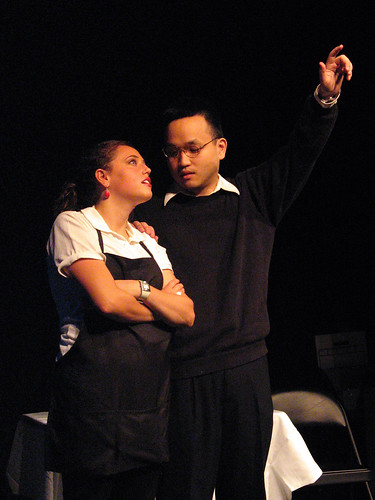 Eva OstrowskaSamantha Glovin as a café waitress and Andrew W. Hsu as Liao Chen in “The Fourth State of Matter”
Eva OstrowskaSamantha Glovin as a café waitress and Andrew W. Hsu as Liao Chen in “The Fourth State of Matter”In “The Fourth State of Matter” by Joseph Vitale, directed by Robert Angelini, a brilliant Chinese astrophysics student studying at an American university has murdered his beloved academic mentor, an eminent cosmologist. Loosely based on shootings at the University of Iowa in 1991, the play explores the genesis of this tragedy, finding parallels in cosmology and its exploration of the universe and its origins.
Played by Andrew W. Hsu, Liao Chen is a stranger adrift in a foreign land, dealing with the effects of his mother’s mental illness and the threat of fierce competition from fellow students for academic honors. These particles making up Chen’s existence culminate in the murder around which the play is set — the cataclysmic Big Bang, so to speak.
Detective Chris Bell (Ed Heavey) is assigned to the case, but his interrogation of Chen leaves him frustrated and perplexed. Chen’s explanations lack concrete reality, leaving Bell to grapple with questions similar to those faced by cosmologists: What is the true motive? Could a senseless crime, committed without apparent reason, be similar to a random act of creation? In a sense, Bell becomes the scientist searching for answers to Chen’s unexplainable universe.
A beautifully written monologue performed by Terrance Montgomery (as Dr. Philip Sheridan, the victim) offers some insight into these mind-bending complexities. “We search for a way to describe the indescribable. We search for a way to describe the way that things are, by comparing them to things that are not.”
The mind is the most valuable tool in understanding the concept of evolutionary time, and yet it has only existed for a fraction of that time. So how can we rely on this limited tool to define the limitless? “The Fourth State of Matter” will test your certitude, and might make you question your perception of people and the universe as well.
“The Fourth State of Matter” is at the Theater for the New City as part of the “Dream Up” festival until Sunday, September 4th.



